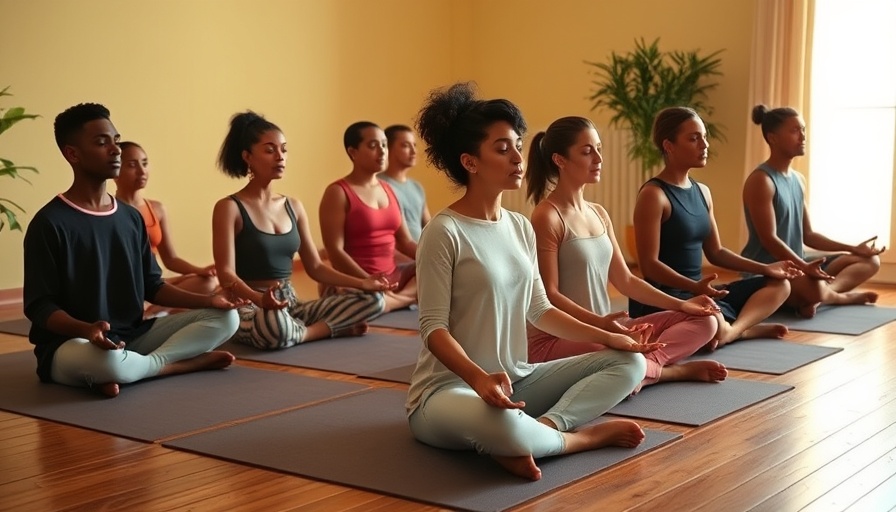
Understanding the Flow State: What It Is and Why It Matters
In the hustle and bustle of modern life, finding a flow state can seem elusive. Yet, this optimal state of experience—where one is completely immersed and engaged—offers profound benefits for both mental well-being and performance. As described by psychologist Mihaly Csikszentmihalyi, flow occurs when we are so deeply involved in an activity that nothing else seems to matter. This state cultivates presence and enhances joy, leading to more fulfilled lives.
Mindfulness as the Pathway to Flow
Mindfulness practice teaches us to remain present in our daily tasks, whether it be through mindful eating or engaging in guided mindfulness exercises. Rather than allowing our thoughts to wander toward past regrets or future anxieties, mindfulness anchor us in the present, creating a fertile ground for flow to thrive. Taking a moment to practice mindful breathing or a body scan meditation can shift our focus, centering our attention on the here and now. In doing so, we become aware of our feelings and responses, allowing for deeper engagement.
The Connection Between Flow and Daily Activities
Everyone can access the flow state, not just artists or athletes. Imagine reading a captivating book, losing track of time while working on a project, or feeling completely absorbed in a conversation. One mother recounted how reading with her daughter provided such an immersive experience that the outside world faded away, highlighting how flow can emerge in everyday tasks. It reminds us that achieving flow doesn’t always accompany extraordinary talent; it can be simple moments filled with attention.
Flow in Different Contexts: From Athletes to Caregivers
Flow is often associated with high performers, such as athletes like Stefanos Tsitsipas or jazz musicians like Buster Williams. Their experiences reveal a common theme: a deep connection with the task where time and worries disappear. However, research has found that full-time caregivers can experience flow just as readily as professional athletes. This inclusive perspective challenges the notion that flow is reserved for a select few, opening the door for anyone seeking to harness this powerful state in their life.
Common Myths About the Flow State
There are misconceptions surrounding what it means to achieve flow. Many believe it comes easily, reserved for those who possess extraordinary abilities or skills. In reality, accessing flow requires practice and the willingness to resist distractions. Furthermore, some may equate flow with constant productivity, but it’s essential to appreciate the quality of experience rather than just the quantity of output. Recognizing that flow comes from dedicated effort and practice can redefine how we pursue engagement.
The Benefits of Mindfulness and Flow for Mental Health
Integrating mindfulness techniques into our daily lives lays the groundwork for experiencing flow and improving overall mental health. Daily mindfulness practices not only enhance our ability to enter this state but also reduce anxiety and elevate our emotional stability. Engaging fully in activities increases our sense of accomplishment and well-being. Thus, exploring how to be present in even the simplest of tasks enriches our lives.
Actionable Tips to Cultivate Flow
1. **Set Clear Goals**: Having specific objectives can help direct your focus and facilitate flow. 2. **Minimize Distractions**: Create an environment conducive to concentration by turning off notifications and eliminating clutter. 3. **Challenge Yourself**: Tasks should match your skills; seek challenges that are slightly beyond your current abilities to engage your mind. 4. **Practice Mindful Breathing**: Try grounding exercises that center your attention before starting tasks. 5. **Reflect on Experiences**: Take time to consider when you feel most engaged—what tasks bring you joy?
Conclusion: Embracing the Journey to Flow
Finding your flow is an evolving journey that requires practice and self-awareness. By embracing mindfulness methods and recognizing the moments of engagement in our lives, we can cultivate flow more readily. Start by incorporating mindfulness for anxiety or mindful living tips into your daily routine, and experience the transformation in both your performance and emotional health. Seek to engage deeply, and find joy in the experience itself.
Are you ready to unlock the power of flow in your life? Begin with small, mindful steps today!
 Add Row
Add Row  Add
Add 




Write A Comment